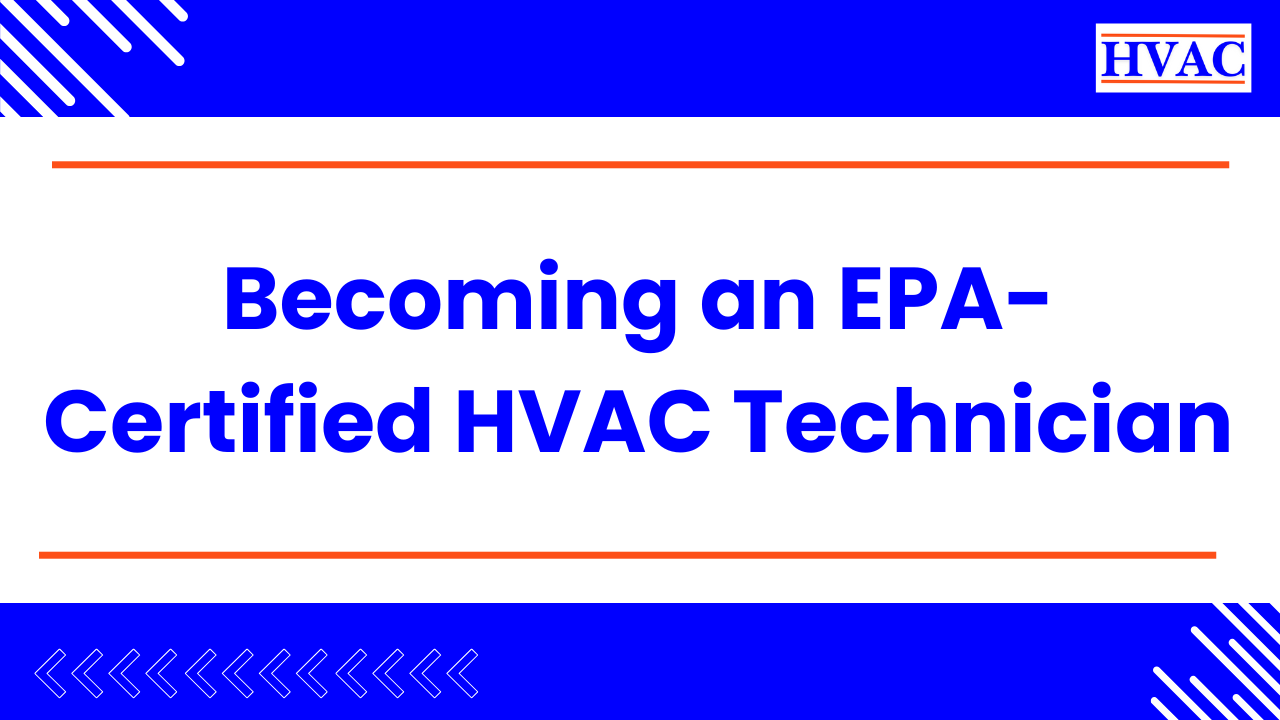Are you considering a career in the heating, ventilation, and air conditioning (HVAC) industry? Becoming an EPA Certified HVAC Technician is a crucial step toward establishing yourself as a competent professional in this field. This guide will provide you with everything you need to know—from understanding the certification process to tips and FAQs to help you succeed. Plus, you’ll find a special free resource at the end of this article to aid your journey.
What Is an EPA Certified HVAC Technician?
An EPA Certified HVAC Technician is a professional who has been certified under Section 608 of the Clean Air Act by the U.S. Environmental Protection Agency (EPA). This certification is mandatory for anyone who works with refrigerants, as improper handling can harm the environment. By obtaining this certification, technicians demonstrate their knowledge and ability to handle refrigerants safely and responsibly.
Why Is EPA Certification Important?
- Legal Compliance: It is illegal to work with refrigerants without EPA certification.
- Environmental Responsibility: Prevent harmful emissions that deplete the ozone layer.
- Career Advancement: Employers prefer certified technicians, leading to better job opportunities and higher pay.
- Credibility: Demonstrates your professionalism and expertise.
How to Become an EPA Certified HVAC Technician
Follow these steps to earn your certification:
- Understand the Types of Certification
- Type I: Small appliances (e.g., refrigerators, freezers)
- Type II: High-pressure appliances (e.g., air conditioners, heat pumps)
- Type III: Low-pressure appliances (e.g., chillers)
- Universal Certification: Covers all appliance types
- Choose a Training Program
- Enroll in an accredited HVAC training program.
- Opt for online or in-person courses based on your schedule.
- Study for the Exam
- Focus on EPA regulations, refrigeration cycles, and safety procedures.
- Use practice tests to familiarize yourself with the format.
- Take the Certification Exam
- Exams are proctored and include both open-book and closed-book sections.
- Achieve a passing score to earn your certification.
- Maintain Your Certification
- Certifications do not expire, but staying updated on industry trends is essential.
Tips and Hacks for Exam Success
- Leverage Study Guides: Invest in high-quality study materials specifically designed for the EPA exam.
- Understand Core Concepts: Focus on refrigerant types, handling procedures, and environmental impact.
- Join Study Groups: Collaborate with peers to clarify doubts and exchange knowledge.
- Use Mnemonics: Simplify complex concepts with memory aids.
- Practice Time Management: Familiarize yourself with the exam’s time constraints.
Common FAQs About EPA Certification
1. Who Needs EPA Certification?
Anyone who handles refrigerants in HVAC systems must be certified, regardless of experience.
2. How Long Does It Take to Get Certified?
The process typically takes a few weeks, depending on your study pace and exam availability.
3. What Are the Exam Costs?
Costs vary but generally range from $20 to $150, depending on the type and provider.
4. Can I Take the Exam Online?
Yes, many organizations offer online exams with remote proctoring.
5. What Happens if I Fail?
Most programs allow retakes, often with a reduced fee.
6. What Is EPA for HVAC?
The EPA, or Environmental Protection Agency, oversees the certification process to ensure HVAC technicians handle refrigerants responsibly and in compliance with environmental regulations.
7. What Is the Best EPA Certification for HVAC?
The Universal Certification is the most comprehensive, as it allows you to work with all types of equipment and refrigerants.
8. What Is an EPA?
The EPA stands for the Environmental Protection Agency, a federal organization responsible for protecting human health and the environment.
9. What Is HVAC Certification?
HVAC certification validates a technician’s knowledge and skills in heating, ventilation, air conditioning, and refrigeration systems.
10. What Is EPA Standard?
EPA standards are guidelines and regulations designed to protect the environment and ensure safe practices in industries such as HVAC.
11. What Is the EPA Qualification?
The EPA qualification ensures that a technician can safely and effectively handle refrigerants and comply with environmental laws.
12. What Is EPA Certificate?
An EPA certificate is the document provided upon passing the Section 608 exam, proving your certification.
13. How to Check EPA Test Results?
Most testing organizations provide results online or via email within a few days of the exam.
14. Is EPA Good or Bad?
The EPA is beneficial as it enforces regulations to protect the environment and public health.
15. What Is EPA Example?
An example of the EPA’s work includes setting standards for refrigerant use in HVAC systems to reduce ozone-depleting emissions.
16. What Does EPA Stand for in Job?
In the context of jobs, EPA stands for the Environmental Protection Agency, emphasizing compliance with environmental regulations.
Enhancing the User Experience: What to Include in Your Blog
- Visual Content
- Infographics: Highlight the certification process and types of certifications.
- Step-by-Step Diagrams: Illustrate common HVAC systems and refrigerant handling procedures.
- Images: Include photos of HVAC tools, equipment, and study materials.
- Interactive Elements
- Quiz: Add a short EPA exam-style quiz to test readers’ knowledge.
- Checklists: Provide a downloadable checklist of steps to certification.
- Free Resource
- Free Study Guide: Offer a downloadable PDF with key topics and practice questions to help readers prepare for the exam.
Conclusion
Becoming an EPA Certified HVAC Technician is a rewarding step for anyone pursuing a career in the HVAC industry. Not only does it ensure compliance with federal regulations, but it also sets you apart as a skilled and responsible professional. With the tips and resources provided in this blog, you’re well on your way to achieving certification and excelling in your career.





